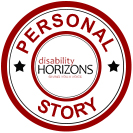
How HIV and AIDS can be disabling – and the importance of getting tested
As many of us know, the spectrum of ‘disability’ is far-reaching, and there are a wide array of hidden disabilities that can be just as disabling as those we can see. Back in 2006, Roland Chesters was diagnosed with both HIV and an AIDs-related illness. It completely changed his life. After struggling to work with the disabling illness, he became disability rights campaigner aiming to break down the stigma around HIV and AIDS.
 On 1st September 2006, at the age of 46, I was told that I had just two weeks to live. I had been very poorly for a long time. I had suffered the loss of movement in my arms and legs and the ability to speak. I also had frequent dizzy spells, suffered from tiredness and confusion, and was under-performing at work.
On 1st September 2006, at the age of 46, I was told that I had just two weeks to live. I had been very poorly for a long time. I had suffered the loss of movement in my arms and legs and the ability to speak. I also had frequent dizzy spells, suffered from tiredness and confusion, and was under-performing at work.
I thought I was going mad. I had seen numerous oncologists, cardiologists, psychologists and a neurologist, but they didn’t know what was wrong with me.
It was only when my partner Richard started attending some of the appointments with me that I was diagnosed. One consultant, recognising that we are a same-sex couple, suggested I have an HIV test. I was told that I have HIV and the ‘AIDS-defining illness’, Progressive Multifocal Leukoencephalopathy (PML).
The HIV virus attacks CD4 cells, which are white blood cells that protect your body from infection. Previously, treatment was recommended to start once they dropped to 350. An acquired immunodeficiency syndrome (AIDS) diagnosis is given when it gets below 200. Lower than 100, a person is not expected to recover. Mine was at just 62.
PML is a degenerative disease of the brain that impairs cognitive and motor functions, and includes symptoms of dementia. It usually affects people in the late stages of AIDS and has a 5% to 10% survival rate.
We had been planning to go on a two week holiday days after the test. But doctors warned that if we did I would be ‘coming back in a box’. I’m lucky to still be alive. But, had I been tested earlier, I could have avoided the longterm effects on my brain and motor skills.
How an HIV-related illness affects me
 I’d only had one other long-term relationship, previous to Richard, and did not suspect I had HIV. I was angry that what now seemed to be blindingly obvious symptoms of an HIV-related illness were missed. I thought I was going to die.
I’d only had one other long-term relationship, previous to Richard, and did not suspect I had HIV. I was angry that what now seemed to be blindingly obvious symptoms of an HIV-related illness were missed. I thought I was going to die.
It affects my concentration, coordination memory and I have some difficulties with speech. I was later diagnosed with dyspraxia, a coordination disorder, as a direct consequence of the encephalopathy.
My verbal and written skills are no longer up to scratch, which is disappointing for someone with my background – I have a modern languages degree and worked for the Foreign and Commonwealth Office as a language-testing specialist.
This could have been avoided had I got an earlier diagnosis and treatment.
In 2017 around 100,000 people in the UK received specialist HIV care. Public Health England, which is part of the Department of Health, reported 7,800 cases of people being unaware of their infection. 43% of those diagnosed are at the late stage of the infection.
Working with HIV and AIDS
At the time, I was working as a civil servant in Westminster. I had to take five months off work to regain some of my abilities. I was later diagnosed with post-traumatic stress disorder (PTSD). Sexual health records are kept separate and confidential to other medical records, so my employers only knew that I had encephalopathy. They weren’t made aware that about the HIV/AIDS or two-weeks-to-live diagnosis.
On my return to work, I shared the full picture with my line manager. She, of course, had to tell HR. The instruction came back to not share that information with anybody else.
They said that as the organisation could not be held responsible for how people would react or respond to it. I complied. For a time.
But it proved too difficult and so I forced the situation. I managed a small team of people and brought them together to share the diagnosis with them. They were great. They actually wished I had told them sooner. Not so that they could have avoided using the same keyboard/cup/chair as me, but so that they could have understood better what was happening.
However, It was still proving difficult for me to manage people at a time when my focus had to simply be on staying alive. I approached HR and they told me that my recourse was to apply for early retirement on medical grounds. I declined the offer, joined the Union.
With a Union rep by my side, I undertook two years of negotiation, and all at a time when I was most vulnerable. I was hugely relieved and grateful when an agreement on workplace amendments was arrived at.
Eventually, I decided to become self-employed and work as a Disability Development Consultant and start up my own company, Luminate. I’m also an active disability rights campaigner, fighting discrimination against people with HIV and AIDS.
Treatments for HIV and AIDS
Advances in treatments mean that HIV is no longer considered the death sentence it once was. Early diagnosis and treatment mean people living with HIV can expect to live as long as the general population – as well as reducing the risk of passing it on.
HIV is treated with antiretroviral medication, which works by stopping the virus replicating in the body. The treatment can make a person’s viral load so low that it can’t be detected by tests. When this happens, they cannot pass on the virus.
The drugs also allow the immune system to repair itself and prevent further damage. Treatment with anti-HIV drugs is sometimes called combination therapy. This is because people usually take three different drugs at the same time, often combined into one tablet.
It’s also known as antiretroviral therapy (ART), or highly active antiretroviral therapy – HAART for short. The UK START study found that people who delayed treatment had a significantly higher chance of developing AIDS-related illnesses, such as cancers. Survival after diagnosis with AIDS-related neurological illnesses has improved since the advent of HAART.
But late diagnosis can cut life expectancy and impact a person’s quality of life. People living with undiagnosed HIV are also at risk of passing the virus on to partners, so getting tested is incredibly important. Tests are carried out discreetly and there’s even the option to order a home testing kit online.
Stigma around HIV and AIDS
Whilst treatment has moved on, knowledge and information about HIV and AIDS in the public domain has not kept up with it. I experienced stigma and discrimination as a result of my decision to speak openly about my diagnosis. This has lead to many people living with the condition choosing to keep it to themselves.
Until those people feel safe and confident enough to be able to speak about their condition and educate others, the stigma driven by fear and ignorance will continue. And that stigma has a massive mental toll on the HIV community, where the suicide rate is twice that of the non-infected population.
I commissioned a national survey to mark the 30th World AIDS Day on 1 December 2018. One of the questions asked was: ‘If a friend of yours tells you they have been diagnosed with HIV/AIDS, how would you react?’ A shocking 21% of respondents said they would either end the friendship or distance themselves from that person.
In an attempt to combat that stigma and that level of ignorance, I have released a book called Ripples: From the Edge of Life. It details my experiences and those of 13 other people living with HIV in the UK. I hope it will also offer support to others affected by a life-changing diagnosis or disability in later life.
The book, referring to how the issues can have a ripple effect on everyone, also shows how education and awareness can tackle the spread of HIV and the stigma around it.
Further information on HIV and AIDS
- Aidsmap: drugs to treat aids neurological disorders
- Medscape: HIV Encephalopathy and AIDS Dementia Complex
- NAT: HIV numbers
- Government: diagnosis of HIV (undiagnosed/late stages page 40 and 41)
- Public Health Matters: risks of late diagnosis
By Roland Chesters
More on Disability Horizons…